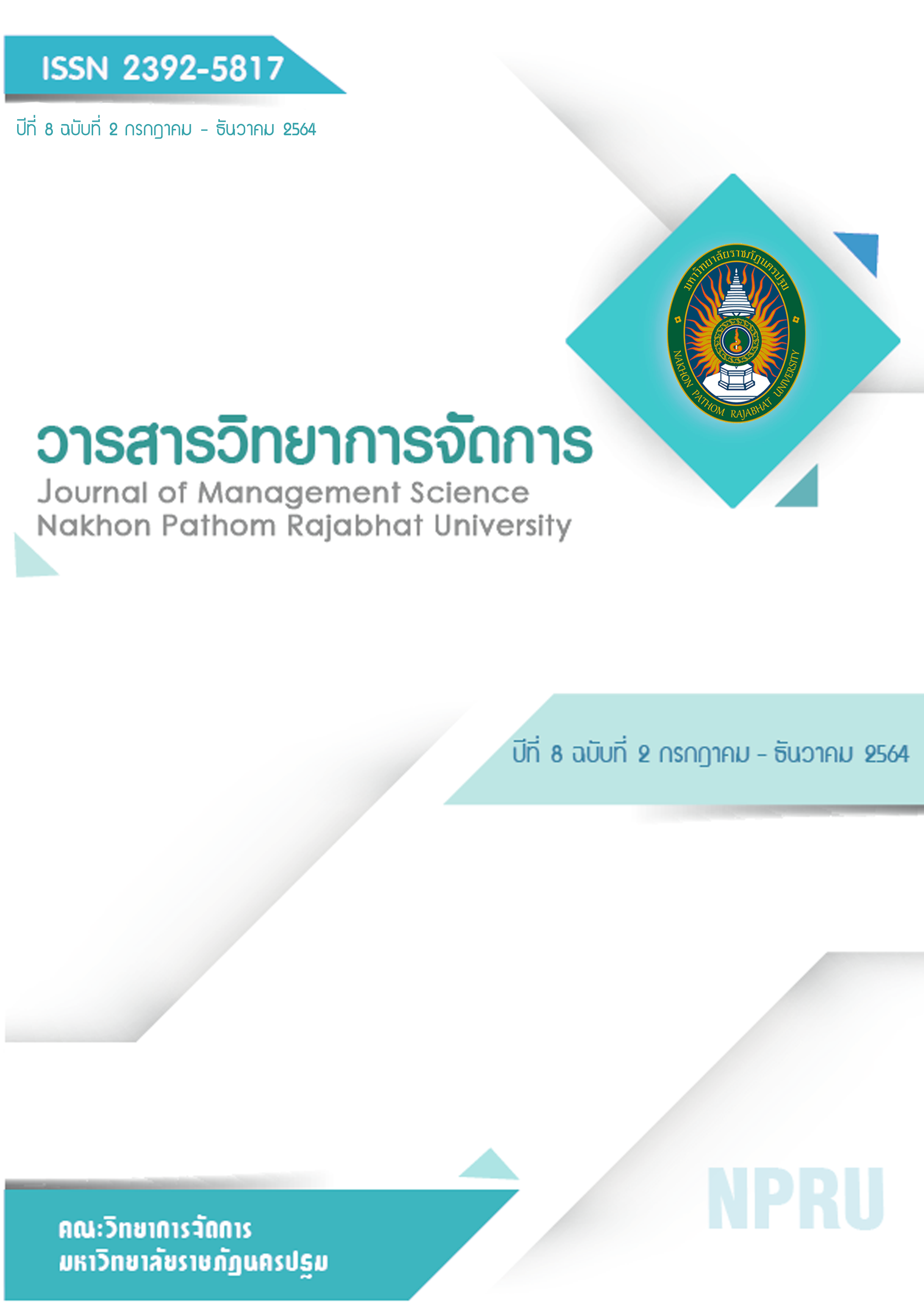The Effects of Shareholder Structure, Profitability and Capital Structure on Corporate Income Tax Planning of Listed Companies on The Stock Exchange of Thailand: Real Estate and Construction Industries
Main Article Content
Abstract
The objectives of this research were to investigate the effects of shareholder structure, profitability, and capital structure on tax planning of listed companies on The Stock Exchange of Thailand: real estate and construction industry. The samples were listed companies in real estate and construction industry except property funds and real estate investment trusts. The research using secondary data collected financial statement, form 56–1 and annual report during year 2017 to 2019 from Set Market Analysis and Reporting Tool (SETSMART). The data collected from 84 companies consisted of 237 firm-year. The measurement of tax planning concentrated on corporate income tax planning measured by Effective Tax Rate (ETR). While shareholder structure focused on family ownership. In addition, profitability measured by return on equity and capital structure measured by debt-to-equity ratio. The statistics used were descriptive and multiple regression analysis at 0.05 significant level. The results revealed that the shareholder structure and capital structure had the positive influence on corporate income tax planning. In addition, profitability had the negative influence on corporate income tax planning.
Article history : Received 18 February 2021
Revised 10 March 2021
Accepted 19 March 2021
SIMILARITY INDEX = 0.00 %
Article Details
The views and opinions of the article appearing in this journal are those of the author. It is not considered a view and responsibility of the editorial staff.
References
ชาครีย์ อักษรถึง และ คธาฤทธิ์ สิทธิกูล. (2559). การพัฒนาดัชนีราคาที่อยู่อาศัยของไทย. Stat-Horizon
Statistics and Information Systems Department. ธนาคารแห่งประเทศไทย [ออนไลน์]. สืบค้นเมื่อ 5 มกราคม 2564 จาก https://www.bot.or.th/Thai/Statistics/Articles/Doc_Lib_stat isticsHorizon /RPPI.pdf.
ตลาดหลักทรัพย์แห่งประเทศไทย. (2563). การจัดกลุ่มอุตสาหกรรมและหมวดธุรกิจ. [ออนไลน์] สืบค้นเมื่อ 12 พฤศจิกายน 2563 จาก https://www.set.or.th/th/regulations/simplified_regulations/indus try_sector_p1.html
ธัญพร ตันติยวรงค์. (2552). การศึกษาปัจจัยที่มีอิทธิพลต่อการวางแผนภาษีและความสัมพันธ์ระหว่างการวางแผนภาษีกับมูลค่าของกิจการ : หลักฐานเชิงประจักษ์จากประเทศไทย. ดุษฎีนิพนธ์ปริญญาบัญชีดุษฎีบัณฑิต จุฬาลงกรณมหาวิทยาลัย.
เยาวนารถ เพียรธนะกูลชัย. (2552). การวิเคราะห์ความสัมพันธ์ของปัจจัยด้านขนาดและสัญชาติของบริษัทกับระดับการวางแผนภาษีอากรในธุรกิจอสังหาริมทรัพย์. วิทยานิพนธ์ปริญญาบริหารธุรกิจมหาบัณฑิต มหาวิทยาลัยเทคโนโลยีราชมงคลธัญบุรี.
ศิลปพร ศรีจั่นเพชร. (2551). ความรับผิดชอบของคณะกรรมการบริษัท โครงสร้างของผู้ถือหุ้นกับมูลค่าเพิ่มเชิงเศรษฐศาสตร์. วารสารวิชาชีพบัญชี, 4(10), 26-39.
ศูนย์วิจัยกสิกรไทย. (2563). กระแสทรรศน์ 3168. [ออนไลน์] สืบค้นเมื่อ 27 กุมภาพันธ์ 2564 จาก https:// kasikornresearch.com/th/analysis/k-econ/business/Pages/z3168-construction.aspx.
Aminah, A., Chairina, C. & Sari, Y. Y. (2017) The influence of company size, fixed asset intensity, leverage, profitability, and political connection to tax avoidance. AFEBI Accounting Review (AAR), 2(2), 30-43.
Dyreng, S.D., Hanlon, M., and Maydew, E.L. (2006). Long-Run Corporate Tax Avoidance. Retrieved December 25, 2020, from http://papers.ssrn.com/sol3/ papers .cfm?abstract _id=1017610
Halon, M., Mills, L. F., & Slemrod, J. B. (2005). An empirical examination of corporate tax noncompliance. Ross School of Business Paper No. 1025 Retrieved December 26, 2020, from http://ssrn.com/abstr act=891226 or http://dx.doi.org/10.2139/ssrn.
.891226.
Hoffman, W. H. (1961). The theory of tax planning. The Accounting Review, 36(2), 274 – 281.
Irianto, B. S., Sudibyo, Y. A. & Wafirli, A. (2017). The influence of profitability, leverage, firm size and capital intensity towards tax avoidance. International Journal of Accounting and Taxation. 5(2), 33-41.
La Porta, R., Lopez-de-Silanes, F., Shleifer, A., & Vishny, R. (2000). Investor protection and corporate governance. Journal of Financial Economics, 58(1-2), 3-27.
Manurung, A. H. (2019). The influence of liquidity, profitability, intensity inventory, related party debt, and company size to aggressive tax rate. Archives of Business Research, 7(3). 105-115.
Modigliani, F., & Miller, H. M. (1958). The cost of capital corporation finance and the theory of investment. The American Economic Review, 48(3), 264-297.
Pearson, E. S. (1932). The test of significance for the correlation coefficient: Some further results. Journal of the American Statistical Association, 27(180), 424–426.

